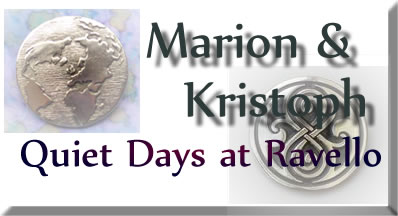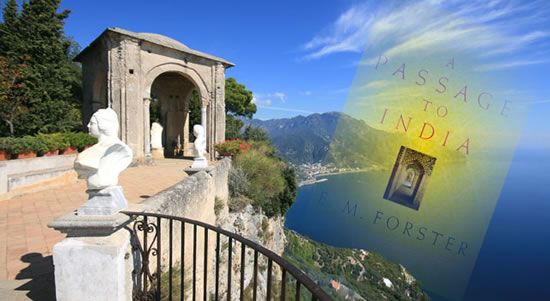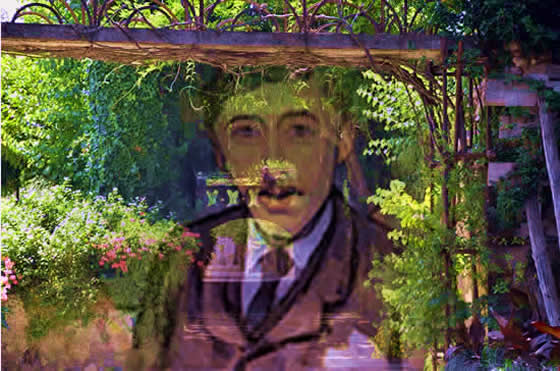

Marion sighed contentedly as she looked out over a gloriously azure sea and a sky only a shade lighter. In the distance a steam yacht moved swiftly out into the branch of the Mediterranean called the Tyrrhenian Sea. Somewhere just past the horizon were Corsica and Sardinia. The yacht might have been heading for one of those magnificent islands, but Marion had no desire to travel with it.
She was happy here, watching boats and ships of many sizes leave the Italian mainland for those destinations and others.
Here was a clifftop belvedere called the Terrazzo dell'Infinito – The Terrace of Infinity. The title made Kristoph laugh. The view from such a high vantage point over a beautiful sea vista was magnificent, he said, but the people who named it couldn’t even begin to imagine infinity. That was something even Time Lords, who could see it if they chose, had trouble fully comprehending.
She was the only one sitting there most days. The other guests liked to promenade along the clifftop walk admiring the view or taking in the famous gardens with their classical style follies and delightful varieties of plants. Marion was still not able to walk far without becoming breathless, so a table and chair with a big blue parasol for shade had been placed there just for her.
It was perfect. The summer breeze coming off the tranquil sea reminded her of the most expensive perfume. She sat contentedly there every day from just after breakfast to tea time, leaving her place for lunch indoors and a period of quiet bedrest when the midday sun was just a little too hot to bear. She read all of her favourite books and some that she had never read before. She listened to music on a brass horned wind up gramophone. Cool drinks and bowls of fruit were brought to her by attentive servants from the great house above the cliff.
She stopped reading regularly to talk with those promenaders as they paused to sit under the parasol with her. Almost all of them were people of literary or artistic importance. This was 1937 and the English owner of the magnificent Villa Cimbrone, the third Baron Grimthorpe, and particularly his sister, Lucille Beckett, who was responsible for the widespread fame of the gardens, liked to have such people as his guests. In Marion’s own time the house was an exclusive luxury hotel where Hollywood celebrities and well paid footballers escaped the public eye and the gardens were popular with day tourists. When Kristoph suggested Villa Cimbrone as a place for her to recuperate from her illness, she chose one of the glorious summers of the nineteen thirties without hesitation.
This was, as she knew well, a troubled summer for the world. Fascism was on the rise across Europe and was already enveloping this peaceful coast in subtle and not so subtle ways, though it was not so noticeable yet within the very English confines of Villa Cimbrone. India was a dangerously troubled place as the call for independence grew louder. America was struggling to rebound from the Depression. Britain was recovering not only from the world-wide effects of that American economic disaster but from the shock of the Abdication. It had just crowned King George VI in hope of preserving both the monarchy and the nation relatively intact.
For this summer, at least, many of those troubles were far away, and Marion was enjoying living in the ‘present’, something Kristoph always encouraged her to do.
She looked up from her book at the sound of footsteps and noticed a jacketless gentleman with a thick moustache hiding his top lip and a straw boater hiding most of his forehead. He stopped by the table and smiled warmly at her. She caught her breath as she recognised him as the author Edward Morgan Forster.
On the cover of the book she had just put down, marking her page with a scrap of folded paper, was the more familiar form of his name - E M Forster.
"Are you enjoying the book?" he asked.
"It is one of my favourites of the works of the twentieth century authors," she answered. "And the best of yours, Mr Forster."
"I am flattered by your praise," he said.
"It isn’t flattery. This really is one of my favourites. I didn't select it because I knew you would see me reading it. I... didn't even know you were a guest."
"I only arrived late last night," he explained. "But I must confess that I had been told of the invalid lady reading A Passage to India on the Belvedere. I came out of pure vanity."
"You are forgiven," Marion told him. "Besides, the writer of such a book is entitled to a little vanity. But... Oh dear… ‘The invalid lady’?" She smiled wryly. "I suppose that is how I must look to everyone else. I don't think I like it. I really want to get better and be able to walk in these lovely gardens."
"Lady Lucille said that you were improving every day. Perhaps before my visit here is over you will feel well enough to walk with me and enjoy this lovely place to the full."
Marion was surprised. E.M. Forster had all but arranged a date with her. It was only a walk in the garden, but it was a firm offer, nonetheless. It was her turn to feel flattered.
"I... would like to do that," she answered. "Thank you, Mr Forster."
"Edward, please," he begged her. "If you will permit me to call you by the same familiarity."
"Marion," she told him. Then she glanced across his shoulder. A slender young man was walking past them in a deliberately nonchalant way – something that was quite impossible, of course. He was glancing meaningfully towards them while trying to be subtle about it. Again this was an impossible feat. "I think somebody else wants to keep you company, Edward."
He looked around and then turned back to Marion with a rather disconcerted expression.
"It is quite all right," she assured him. "It has been charming meeting you, but I am happy to get on with my reading. You enjoy the gardens with your friend."
"It was utterly charming to meet you, Marion," Edward answered her. “I shall make a point of talking about literature with you again, soon.” He leaned forward to kiss her on her cheek then turned to catch up with his friend.
Marion watched them together and remembered another E.M. Forster novel written around this time but not published until after his death in nineteen seventy.
That book explained the world of secret glances and unspoken needs that Edward lived in and which she had briefly experienced just now.
She sat back and sipped a cold drink, letting the sea breeze cool her face. She closed her eyes and gave her other senses the chance to experience the pleasure of warmth on her skin, the sound of the sea far below, of birds in the sky, voices somewhere in the famous gardens that the famous artist and gardener Vita Sackville West had redesigned not so long ago.
She wasn't sure when she fell asleep or how long she slept, but the next thing she knew Kristoph was there. She opened her eyes and sat up straight as he kissed her on the lips and handed her a freshly cut rose in a slender water-filled glass.
"A Rose of Ravello," he said of the perfectly formed creamy-white bloom. "Cultivated here in the gardens of Villa Cimbrone and a gift to you from Lady Lucille. I mentioned how much you love roses and she cut this one for you. She said she would prepare a live cutting for you to plant in your own garden."
"She doesn’t know that my own garden is two hundred and fifty million light years away?"
"She does not. She believes that we live in Berkshire and are personal friends of the Duke and Duchess of Windsor, hence our invitation to stay the season here. She still calls him His Majesty, I notice.”
“Most of the guests do,” Marion noted. “I don’t think they mean it as disrespect to his brother, but as a way of acknowledging that he was King if only for a little while.”
“The English language doesn’t have a word for an ex-king who is still alive and kicking,” Kristoph agreed. “It doesn’t matter to us, anyway. The last time we met he invited us to call him David.”
Marion laughed softly.
“At that delightful party during our last visit to the French Riviera,” she recalled. “It was our first trip on the Blue train that really cemented the friendship, though.”
She happily recalled those past visits to this eventful decade of Earth history and then laughed softly and asked how she ever became the sort of person who could talk so casually about friendship with royalty.
“Technically, I am far more important,” Kristoph pointed out. “I am president of an entire planet, and a politically powerful one at that. You shouldn’t be shy of mixing with mere royalty.”
Marion laughed again and was pleased not to need oxygen after doing so. There was enough of it around her on this spectacular clifftop. She told Kristoph of her meeting with Mr Forster – Edward as he was to her now - and the ‘date’ he had arranged with her. His response was teasing and made her blush, which led to more teasing.
“Meeting Edward was even more thrilling that royalty,” she told her husband when he was prepared to be serious again. “I read A Room With a View and Howard’s End when I was a teenager and was captivated by the colour and the romance of such stories. And A Passage to India was one of the few texts I still enjoy from my undergraduate reading list. If Virginia Woolf was staying here this summer she would NOT come along the Terrazzo and find me reading any of her works.”
Kristoph laughed at Marion’s scornful dismissal of one of the early twentieth century’s greatest writers. He remembered well her reactions to Woolf at the time when they lived together in Liverpool, he a professor at one university and she a student at another.
“Your third year essay about Mrs Dalloway was well received as I recall.”
“Yes, but have you ever seen me read it since? There isn’t even a copy in our home. I donated them all to a second hand book shop near the university as soon as I graduated. But I love Passage to India. THAT came with me to Gallifrey when we left Earth.”
“And a worthy choice it is. I am often tempted to read the chapter about the Marabar Caves out loud in the Panopticon,” Kristoph observed. “Great thoughts are spoken there and all that comes back is ‘boum’. There are days when our great hall of wisdom resembles those caves.”
“I didn’t even know you had read it,” Marion answered him.
“I WAS a literature teacher when we met,” he reminded her. “Actually I thought of Shimla or some other mountainous place in India before I recalled Ravello and the Villa Cimbrone as a good place for convalescence.”
“I’m glad you chose here. I detest the way the English females in this book are always swooning because of the Indian heat. I have felt so ill that I would have been doing the same, and I would hate to look like a weak, pale woman who can’t cope with the climate. Perhaps another year, when I am feeling stronger, we might visit there.”
“Yes,” Kristoph promised. “We certainly will do that. You haven’t fainted at all since we have been here. The Italian climate is certainly good for you.”
“It has been,” she agreed. “I think I will be able to keep my garden date with Edward before the month is over.”
“And he will have my blessing,” Kristoph told her. “The idea has made you smile so much more brightly than you have done for so long. I owe him a great debt of gratitude.”
“You’re supposed to be jealous,” Marion teased him.
“Not at all. I will walk through many gardens with you. I won’t resent him having this one.”

 |
 |
 |